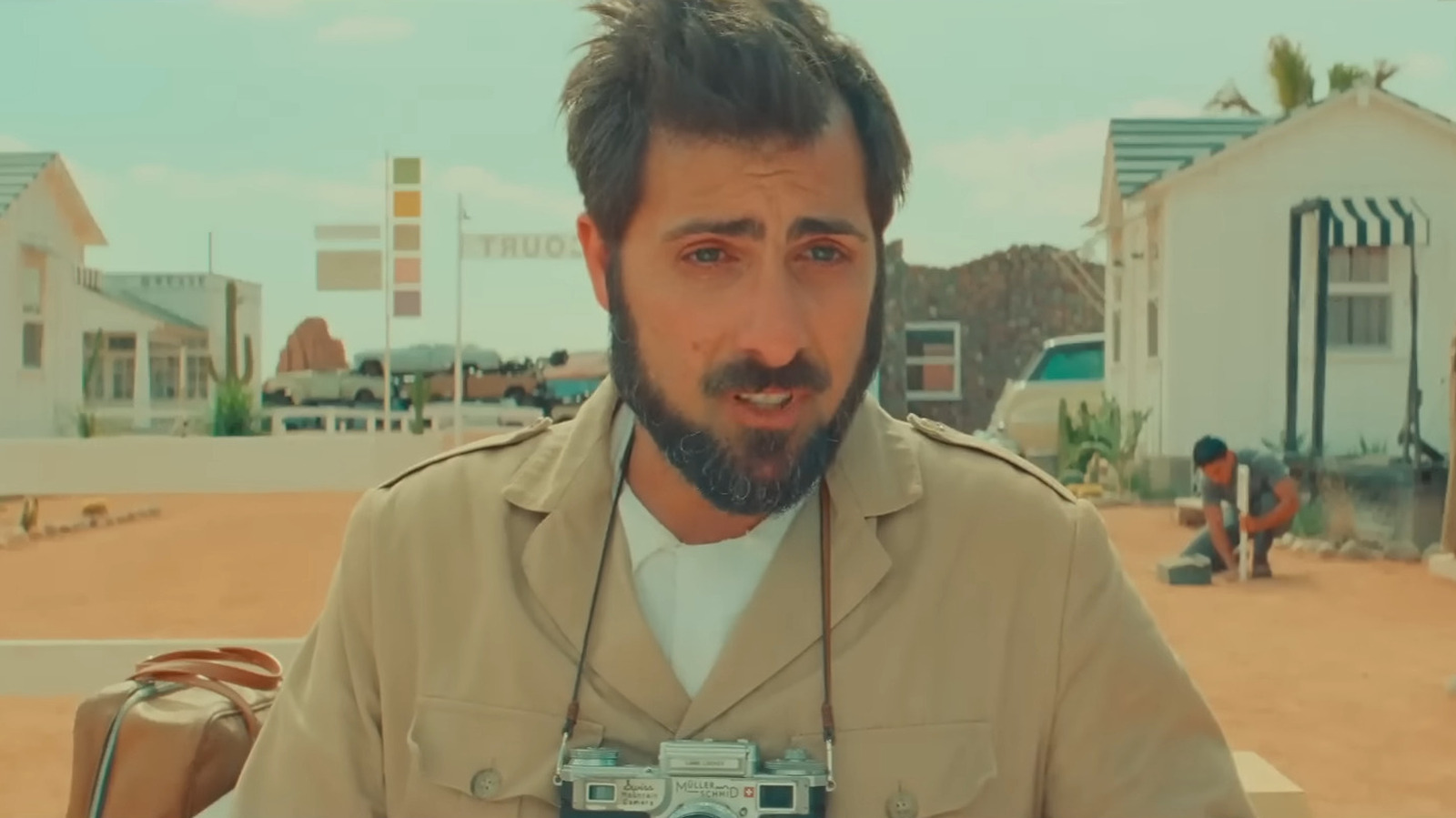
Despite what the vibrant vintage might imply, Wes Anderson’s Asteroid City may be the director’s darkest film (as well as his most brilliant). It is a film about death but tackles the topic head-on beyond The Royal Tenanbaums’ acceptance or The Life Aquatic’s grief. Here’s a movie with the guts to force its quirky characters to stare deep into the abyss of nothing and find the crutches to keep skipping along in the face of dread. The embracing of absurdities makes for a potent Anderson comedy, complete with an overflowing cast.
At the story’s core is the recently widowed Augie Steenbeck (Jason Schwartzman), a photographer with three young daughters and a genius teenage son, Woodrow (Jake Ryan). Not having the heart to tell his children about their mother’s passing, he holds off amid Asteroid City’s big junior science event, where Woodrow is competing. A series of mishaps and encounters force Augie to be more direct with his children, especially when his bitter father-in-law (Tom Hanks) enters the picture with mixed feelings for Augie. There may be a new woman in his life when the depressed and work-obsessed actress Midge Campbell (Scarlett Johansson) quickly forms a bond with him as they chat from their motel windows.
The film dips in and out of its reality by framing the story as a play, occasionally breaking the fourth wall as the omnipresent narrator (Bryan Cranston) sets the stage for the two worlds. His fourth-wall-breaking ranges from establishing the history of the writer and players’ account to stumbling into scenes where he’s not sure he should be present or heard. Framed in black-and-white, the behind-the-scenes drama acts deeper in contemplating life and death, running a tightrope between subtlety and directness.
The narrative of Asteroid City is that the sudden arrival of an alien has placed the small tourist town on lockdown. This leads to the mildly flustered General Grif Gibson (Jeffrey Wright) struggling to maintain order. At the same time, the many teens of the Junior Stargazers try to rebel in the face of authoritarianism and existential dread. The alien, revealed through clever stop-motion, doesn’t mean any harm, but its presence sends the town into a spiral of questioning existence. After the first alien encounter, Augie remarks that the alien had this blank stare at the humans as if we were all doomed. “Maybe we are,” states Midge coldly. This conversation is quickly followed up by Augie burning his hand to feel something.
There’s a freedom present within this film that makes it feel like one of Anderson’s most playful. There are many asides and comical uses of characters, to the point where Jeff Goldblum’s minor role is hilarious, especially for the role he was teased for having in the opening credits. I loved the strange nature of how Steve Carell, as the motel manager, tries to find anything he can sell through vending machines, the most notable being real estate. Rupert Friend delights as a singing cowboy who may be part of the first musical number in an Anderson movie, complete with some dancing. Tilda Swinton has some moments of charm for being a scientist with a nagging notion of a life denied in handling the teens who crowd her observatory. Some actors fit neatly into the narrative, like Matt Dillon as a quirky mechanic, while Liev Schreiber does well as a character who seems like an outsider to the weirdness of Anderson’s worlds.
There’s a firm grip on coming to terms with death that looms over the solid foundation of this premise, complete atom bomb tests going off in the distance. The actors will dip in and out of the play to find meaning in life when it seems like doom surrounds all of them. And through Anderson’s colorful palette and dry wit, there’s an all-encompassing acceptance of life’s oddness. This epiphany of making life worth living is beautifully stated directly by Willem Dafoe as an acting teacher that awakens the message about life and death in a manner that is affirming and scary at the same time.
Asteroid City is such a top-tier Wes Anderson movie that it may be my favorite of his filmography for its heavy thematic focus and astounding cast. It has everything that audiences have come to expect from the director, from the lush visuals to the quirky writing. But the fact that this film can touch into something deeper that isn’t buried under a coating of retro lust makes it shine all the brighter.

 “My Spy: The Eternal City” Review
“My Spy: The Eternal City” Review  “Deadpool & Wolverine” Review
“Deadpool & Wolverine” Review  “The Boys: Season Four” Review
“The Boys: Season Four” Review  “The American Society of Magical Negroes” Review
“The American Society of Magical Negroes” Review  “Twisters” Review
“Twisters” Review  “Sausage Party: Foodtopia” Review
“Sausage Party: Foodtopia” Review  “Robot Dreams” Review
“Robot Dreams” Review  “Godzilla x Kong: The New Empire” Review
“Godzilla x Kong: The New Empire” Review 


